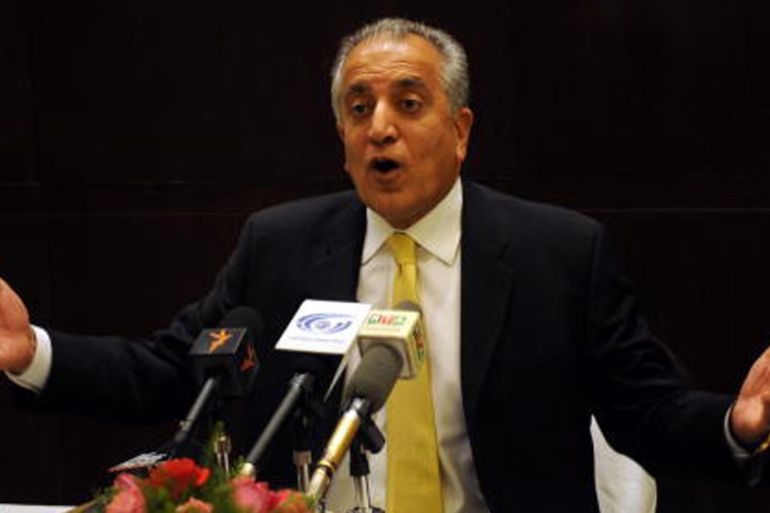Taliban holds talks with US envoy in Qatar
US envoy Zalmay Khalilzad held three days of talks with Taliban officials in efforts to end US’ longest war.

Taliban officials have held three days of talks with the United States’ special representative for Afghanistan in Qatar, Zalmay Khalilzad, aimed at renewing the peace process in the war-torn country, an official of the armed group said.
The talks, which ended on Sunday, were confirmed by other individuals close to the group, who spoke on condition of anonymity because they were not authorised to discuss the negotiations.
Keep reading
list of 4 itemsPhotos: Tourist numbers up in post-war Afghanistan
Taliban ban on girls’ education defies both worldly and religious logic
Afghanistan calls for ‘respect’ after Cricket Australia snub
The Taliban said its dialogue process with Washington was aimed at securing a timetable for the withdrawal of all the US and NATO troops from Afghanistan to pave the way for an intra-Afghan dialogue.
Last week, a five-member Taliban delegation had attended talks in Moscow for the first time at an international conference to discuss the Afghan peace efforts.
“A second phase (of discussions) should be held among Afghans (themselves) on how to bring about peace and form a government in Afghanistan,” Sohail Shaheen, a Qatar-based spokesperson for the Taliban, told reporters in Moscow last week.
The armed group has reported that in meetings with Khalilzad, it is also seeking the release of its prisoners and the removal of international travel restrictions on senior Taliban leaders.
In a lengthy statement issued earlier this month, the Taliban had demanded the lifting of sanctions against the group’s leaders, the release of prisoners and the recognition of their office in Qatar.
At the request of the US, a Taliban office was established in Doha in 2013 to facilitate peace talks but it was shut shortly after opening when it came under pressure over a flag hung outside the premises, the same flag that was flown during the Taliban rule in Afghanistan.
Then Afghan President Hamid Karzai subsequently halted peace efforts, saying the office in Doha was presenting itself as an unofficial embassy for a government-in-exile.
The flag has since been taken down and the office has been empty with no official announcements about a possible reopening. Talks with the Taliban have since been taking place elsewhere in Doha.
No ceasefire
Another individual close to the talks, who also spoke on condition of anonymity because of the sensitivity of the talks, said Khalilzad wants to reach a settlement within six months, a timescale the Taliban said was too short.
Khalilzad also proposed a ceasefire, which the Taliban rejected, the individual said, adding that there was no agreement on the release of prisoners, opening the group’s office or lifting a travel ban on its leaders.
It was reported that Khairullah Khairkhwa, the former Taliban governor of Herat, and Mohammed Fazel, a former Taliban military chief, attended the marathon talks.
Khairkhwa and Fazel were among five senior Taliban members released from the US prison at Guantanamo Bay in 2014 in exchange for US soldier Bowe Bergdahl, who was captured by the Taliban after walking off his base in Afghanistan in 2009.
US President Donald Trump had harshly criticised the 2014 prisoner exchange and in a speech last August pledged to send in additional troops and redouble efforts to defeat the Taliban.
But that strategy has had little, if any, effect on the ground, with the Taliban keeping up a steady tempo of attacks and an affiliate of the Islamic State of Iraq and the Levant (ISIL, also known as ISIS) group carrying out massive bombings targeting the country’s Shia minority.
The Trump administration now appears focused on reaching a political settlement with the Taliban, beginning with the holding of direct talks. The Taliban have long refused US demands to negotiate with the Western-backed government in Kabul, which the rebels view as a puppet regime.
Call to defer election
A third individual with knowledge of the discussions said the Taliban pressed for a postponement of next year’s presidential elections and the establishment of an interim government under a neutral leadership.
Abdul Sattar Sirat, an ethnic Tajik and Islamic scholar, was suggested as a candidate to lead an interim administration.
The Taliban in a statement confirmed its participation in what it called the preliminary talks, but denied reports that the group reached an agreement on any issue.
“The propaganda being spread by media outlets about an interim government, future president or elections, or rumours spread by anonymous circles and individuals or predictions by some analysts are all baseless and hold no truth,” the statement said.
Pakistan has meanwhile, released a number of high-level Taliban prisoners, including the movement’s cofounder Mullah Abdul Ghani Baradar. The releases are widely seen as a US-directed move aimed at encouraging the Taliban to participate in talks.
Khalilzad has been touring the region in recent days, and reportedly met Afghan President Ashraf Ghani on Sunday. He is expected to press Ghani to cobble together his own negotiating team, which could prove difficult given the deep divisions within the government.
The Wall Street Journal, citing a person familiar with the gathering, said Khalilzad met Taliban officials in Doha for the second time in four months. US officials could not immediately be reached for comment as the State Department has refused to comment on reported talks with the Taliban.
US Secretary of Defense James Mattis thanked Qatar speaking before a meeting in Washington on Tuesday and said: “In Qatar, we recognised a long-time friend and military partner for peace and stability in the Middle East and a supporter of NATO’s mission in Afghanistan, and here I must note Qatar’s recent highly successful delivery of materials from Hungary to NATO’s mission in Afghanistan is proof of your global reach.”